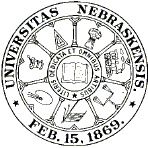
University Studies (University of Nebraska) (1888–1984)
Date of this Version
7-1905
Citation
UNIVERSITY STUDIES, Vol. V, No.3, July 1905.
Abstract
The substantivation of adjectives in English has, like most other processes of our language, been so gradual that it is difficult to fix the beginning of it in the case of any particular word or group of words, or at anyone time to measure accurately its progress. Perhaps the most satisfactory results are obtained by . comparing the data made up from the writings of authors of different periods. This investigation is offered as a study of the process of .substantivation of adjectives in the fourteenth century, as shown in the writings of Chaucer. Kellner names three ways in which adjectives become substantivized: first, the quality of a thing is so striking that the name of the adjective is adopted for the substantive itself. So gold was originally 'the yellow metal,' wheat, the 'white grain,' etc. Secondly, ellipsis may bring about this process of substantivation. Since the adjective conveys the idea of the noun to which it is attached, the noun is dropped. So we have the Almighty, a saint, a sage, the good, etc. Finally, adjectives are used as substantives when they denote abstract ideas, as good, evil, ill, etc.
For a proper appreciation of the substantivation of adjectives in Chaucer we must consider examples of all three usages, namely, qualifying a preceding noun, with one, and without one, as a .pure substantive. Then a comparison can be made with reference to the relative importance of the three in Chaucer's time. Also it might be of interest and profitable to compare the use of positives, comparatives, and superlatives in this respect. The syntactical relations of substantivized adjectives seem to demand consideration. In what constructions do we find them prevailing? Do they appear in any special constructions in Chaucer? Finally, and of some importance it seems to me, are the questions and theories relating to the beginnings of- this process of substantivation. Is it a native tendency or does, it come into the language through some foreign influence? Are the adjectives so substantivized largely native words or foreign? Perhaps a careful comparison of the two elements will throw a little light on the subject of the origin of adjective substantivation.

